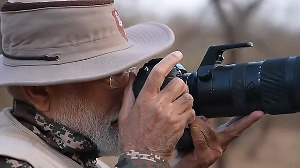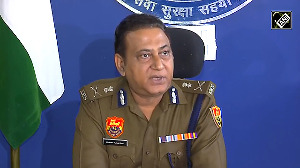A group of St Xavier's College students have stationed themselves near the Metro end of the road. Under the light of candles held aloft with no care to dripping hot wax, they set up a chant: India! India! India!
It starts small. More join in. Those inching past on the other side of the road pause, look, listen, and finally they join in.
'India! India! India!'
Just that, no rhyming slogans, no zindabads, no murdabads -- the name of this country, chanted loud and clear and constant.
Pretty soon, everyone on that stretch of road is chanting just that one name -- and the effect in the late night air of that percussive drumbeat of sound is mesmeric. And like jungle drums of old, it seems to send out a message: We will not be cowed.
The 'rally' was scheduled to begin at 6 -- but which rally? At 5, some three thousand people had already arrived at the Gateway, and in groups of a dozen here, a hundred there, a few hundred elsewhere, were doing their own thing.
A Nirankari group from Sion, north-central Mumbai, was lining itself up single file, preparatory to commencing a march. A group wearing Gandhi caps and flying the Congress flag was shouting slogans condemning Pakistan and calling for war.
The Gateway was filling up -- and in the piazza fronting the monument to a bygone age, a few dozen young people held hands in a human chain that gradually curved, finally met itself. Effectively, space had been cleared in the centre.
Alyque Padamsee, of the advertising world, waited for his cue. With him was Bobby Sista, founder of Population First. Mike in hand, Padamsee called for quiet, introduced himself and his 'group' as citizens concerned with the attacks, and determined that something should be done.
"We are here to listen to your ideas," Padamsee said. "Our volunteers are passing out pamphlets -- please fill them in and drop it in the box here below me."
Like a choreographer, Padamsee worked the crowd, calling for the forms to be sent back, even starting a countdown to signal the end of time. "Just like a school exam," muttered a young collegian in a Mumbai Meri Jaan T-shirt, frantically trying to write on paper balanced on open palm.
Padamsee collected his box and left; lyricist and scriptwriter Javed Akthar took the stage.
"See those TV cameras," Akthar pointed. "Those people who did this to us last Wednesday are watching today. They are watching us, and they know now that do what they will, we can never be beaten, not in a hundred years."
An enormous roar goes up. Akthar seamlessly shifts into a fighting speech in which determination and dedication, revenge and retribution, are the main tropes. The speech is punctuated with applause, roars. The crowd is in that kind of mood: Anger sizzles in the gathering dusk, a palpable rage that is almost an audible sizzle in the background of Akthar's outburst. Anything that feeds that anger will be applauded; incongruously, at one point, a voice in the crowd yells out: 'Once more!'
Akthar concludes: 'We will now sing the national anthem, and then we will go home.'
Jana gana mana adhinayaka... the familiar words begin in his baritone, and are picked up and amplified by a thousand throats. You've heard this sung in a few hundred assemblies and public meetings and in darkened cinema halls - but this day, this anthem from this crowd in front of the Gateway of India, sounds like nothing you have heard before. Passion throbs in every word -- you realise, with a start, that this is the real meaning of the word 'anthem.'
A young college girl next to us raises her lit candle aloft. It shines light on her face -- and on the tears that stream from her eyes, unnoticed, unheeded. She is not the only one crying.
The anthem ends; Akthar goes home. No one else does. In fact, Mumbai is just beginning to turn up at the Gateway. Hundreds more pour into that confined space and when you think it can hold no more, everyone shifts and a few dozen more enter.
As night falls, lights in the Taj go up. Eight days ago, courting couples and random wanderers and visiting tourists and local touts had stood where we are, under the arch of the Gateway, looking across the road at one of Mumbai's most enduring symbols, glittering like a mammoth diadem against the skyline. A week ago today, the grand hauteur of the Taj Mahal Palace was shattered by a bunch of hopped up criminals who entered it with guns blazing, held it hostage for three days, and left it in ruins.
Now the lights go up. I count them -- 16 lights across a facade that a week ago boasted thousands. The rest of the rooms are blackened ruins but the Taj refuses to quit; at that place, at that time, in that mood, the lights strike you as a signal that this totem of Mumbai's heritage, which has stood for over 100 years, will stand for another 100.
A measure of what the Taj means to Mumbai: the Oberoi, a fellow five-star hotel that too was hit by terrorists that night and that stands a block's walk away, is deserted. A few cops stand guard, but there is no one hanging around, rallying, lighting candles, shouting slogans. The Taj, meanwhile, attracts Mumbaikars like a magnet; provides a focus for this outpouring of rage and of grief.
A few people spot the lights and look; some take pictures on their cell phones. Around them, the rally continues as only Mumbaikars can rally. Not for this city, this people, an organiSed affair with a leader and some speeches and good night, all, see you later.
This is a city where all will lead because none will follow. A hundred rallies spring up around us. A group gathers to shout slogans. Small groups come up to the parapet adjacent the Gateway, find a small private corner, light candles, stick them on the ground, bend their heads in prayer, and then they go away -- college groups, young professionals, family groups, with the littlest children being allowed to hold their candles, with no one admonishing them not to play with fire.
Elsewhere, a group of some three dozen sits in a circle it has cleared for itself. This is a silent rally -- banners say what they will not: Bharat Ma ki Shaan hai, Mumbai Meri Jaan Hai. Bharat Hamari Ma hai, kya baap hamara hijda hai?
If slogans are an indicator of the public pulse, temperatures have long since crossed boiling point. The denunciations -- oral, and through the medium of signs -- are everywhere, and if they are any indication, the politician is fast becoming an endangered species. Maharashtra Chief Minister Vilasrao Deshmukh is a favorite target, but no one is spared: The prime minister, the ruling party, the main Opposition party...
A lone policeman spots my press pass, sidles up, asks me: 'Is it true bombs have been found at Chhatrapathi Shivaji Terminus?' I check back with my office, and confirm that yes, they were found and yes, they have been defused. His relief expresses itself in explicitly scatological abuse aimed at the unknown perpetrators.
The police are everywhere, quietly observing. And they are not spared either. 'Are you hear for a picnic?' an angry citizen loudly demands. In this crowd, any raised voice is enough to create a crowd. One gathers. 'There are thousands of people here and you policemen are standing around with your backs to the wall? How do you know there are no terrorists here?' The crowd agrees, the mood momentarily gets ugly.
Another citizen takes up the cudgels for the beleaguered cops. 'Pay them a decent wage,' he says. 'Make sure they have homes to live in and schools to send their children to and then see -- they will give their lives for you.'
Hum jaan abhi bhi de rahe hain, saab.
'We die for you even now'. It is said in a very matter of fact voice by one of the cops. The silence is sudden, and it is tinged with shame. We have come here at least in part to mourn those -- including so many in uniform -- who died and in our anger, we have forgotten. 'Sorry,' says the man who started the attack. The crowd melts away.
Others form. To light candles. To pray. To shout slogans. No one seems inclined to leave; more people keep pouring in.
People pass on information to one another. There is a rally happening by the promenade opposite the Taj, says one -- lots of actors and actresses are there. There are rallies everywhere, says another. I walked here from Churchgate station; people who are unable to get here because of the crowd are holding their own rallies wherever they can. I just passed one, all the way down near Jehangir Art Gallery, says a third.
In the lanes behind the Taj, it is business as usual. Bade Miyan's, the storied kabab-makers who operate out of a cart parked on the pavement and who are patronised by billionaires, is doing roaring business. So are ersatz entrepreneurs who have set up makeshift stalls selling vada pav, pav bhurji, water, soda...
This is, I realise, a night that will not end. Mumbai has decided in its own idiosyncratic fashion that it does not want an official rally. The multitudes come and mourn in their own ways, and hang around and greet new arrivals and share news and information and rumour and suspicion and above all, anger.
I walk -- that is a misnomer --- inch away from the Gateway, and down the road towards Metro. That is when I spot the St Xaviers' collegians, just as they are starting their chant. As I stand and watch, 'India! India! India!' spreads through the crowd like wildfire, bounces off the surrounding buildings and rebounds off the cobblestones.
It is angry, it is insistent, it is continuous, and it grows in volume with every passing minute, with every passerby who joins in. It is, I think, like a drumbeat.
No -- a heartbeat. The heartbeat of a wounded city that will bleed, but will not bend.






 © 2025
© 2025